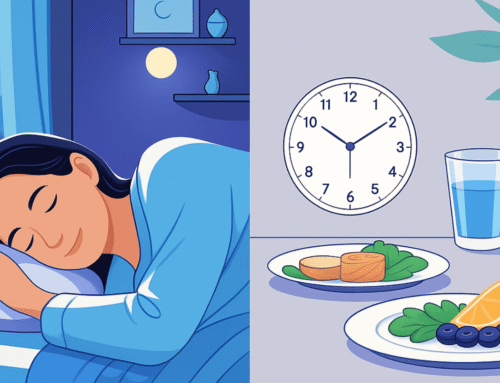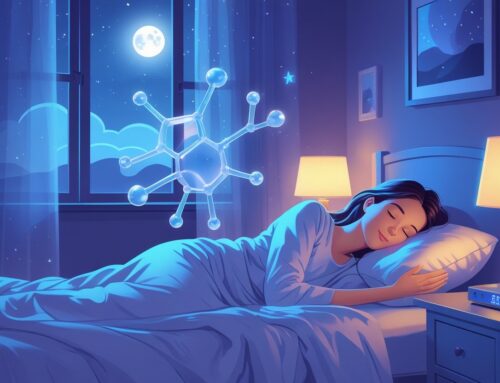Diet and sleep are connected, and what you eat can affect how you rest. Foods with fiber, lean protein, and complex carbs can help your body sleep better. Foods high in sugar, saturated fat, or heavily processed can make it harder to sleep. When you eat and what you eat both change how quickly you fall asleep and how deeply you sleep.
Some foods can help the body relax and support sleep cycles. Fatty fish, dairy, kiwifruit, and cherries contain natural substances that promote sleep. Skipping meals, eating late at night, or consuming too much caffeine or sugar can disturb sleep. Paying attention to these patterns can guide better choices for rest and overall health.
Diet is a simple way to improve sleep without relying on medication. Eating certain foods and timing meals well can improve sleep naturally. Better sleep can lead to more energy, clearer thinking, and improved focus during the day.
Key Takeaways
- A balanced diet supports deeper and more restful sleep.
- Certain foods promote relaxation and healthy sleep cycles.
- Eating habits and meal timing play a crucial role in sleep quality.
- The right mattress supports deeper, cooler sleep, which helps regulate hunger hormones and makes it easier to stick to healthy eating habits.

Understanding the Relationship Between Diet and Sleep

What people eat can change how they sleep, while sleep can also influence eating habits. These two things affect each other in important ways. Specific foods and meal timing impact sleep quality, and poor sleep can change hunger and food choices. Understanding this connection helps people improve both health and rest.
How Eating Affects Sleep Quality
The food we eat can have a big effect on sleep. Meals high in saturated fat and low in fiber can reduce deep sleep. Foods with magnesium or tryptophan can help the body relax and fall asleep more easily. Timing is also important. Eating a heavy meal right before bed can make sleep lighter and less restful. Finishing dinner earlier and keeping it lighter in the evening supports better sleep. Paying attention to what and when you eat can improve overall rest.
The Role of Sleep in Regulating Dietary Habits
Sleep affects how hungry we feel and how full we get. Short or poor sleep can throw appetite hormones off balance, which can lead to stronger cravings for sugary or fatty foods. Not getting enough rest can also make energy drop, which may make cooking healthy meals harder. This can contribute to weight gain and less healthy food choices. Sleeping well helps balance hunger signals and energy levels, supporting better eating habits.
Bidirectional Effects of Diet and Sleep
Diet and sleep influence each other in both directions. Poor food choices can reduce sleep quality, while lack of sleep can increase cravings and snacking. This cycle can affect weight, energy, and overall health. For instance, caffeine or heavy meals close to bedtime can disrupt sleep. Then, poor sleep can drive late-night snacking. Looking at diet and sleep together shows why both need attention for better health and wellbeing. Nutrition and rest go hand in hand.
Biological Mechanisms Linking Nutrition and Sleep
Nutrition influences sleep through complex biological pathways involving brain chemicals, the body’s internal clock, and digestion. Understanding these interactions helps explain how what and when people eat affects sleep quality and patterns.
Neurotransmitters and Hormones Involved
Certain nutrients influence sleep by affecting neurotransmitters like serotonin and melatonin, which control sleep and wake cycles. Tryptophan, an amino acid in foods like turkey and dairy, helps the body produce these chemicals. Eating foods with tryptophan can support deeper, more restful sleep.
Carbohydrates can raise serotonin levels, which may make it easier to fall asleep. Hormones like leptin and ghrelin also affect sleep. Leptin reduces hunger, while ghrelin increases it. Poor sleep can disrupt these hormones, making people feel hungrier and prefer calorie-rich foods. Cortisol, the stress hormone, can rise when sleep is low, causing insulin resistance and inflammation, which can further disturb sleep and metabolism.
The Impact of the Circadian Rhythm
The circadian rhythm is a 24-hour internal clock that regulates sleep and other functions, including hormone release and metabolism. The brain’s suprachiasmatic nucleus (SCN) adjusts this clock based on light and dark cycles.
When people eat at unusual times, it can throw off clocks in organs like the liver and pancreas. This misalignment can affect both sleep and metabolism. Different nutrients also affect clock genes that help maintain the rhythm. For instance, diets high in fat can weaken how the body responds to light, which can change sleep timing and quality.
Digestive Processes During Sleep
Digestion slows during sleep but does not stop. The body shifts energy to restorative functions, which reduces gastrointestinal activity and metabolism. This slower pace can change how nutrients are processed overnight.
Large or heavy meals close to bedtime can disrupt sleep by causing discomfort or acid reflux. The timing and type of food affect hormone release, including insulin and gut peptides, which influence sleep. Eating balanced meals earlier in the day can help digestion and reduce sleep disturbances.
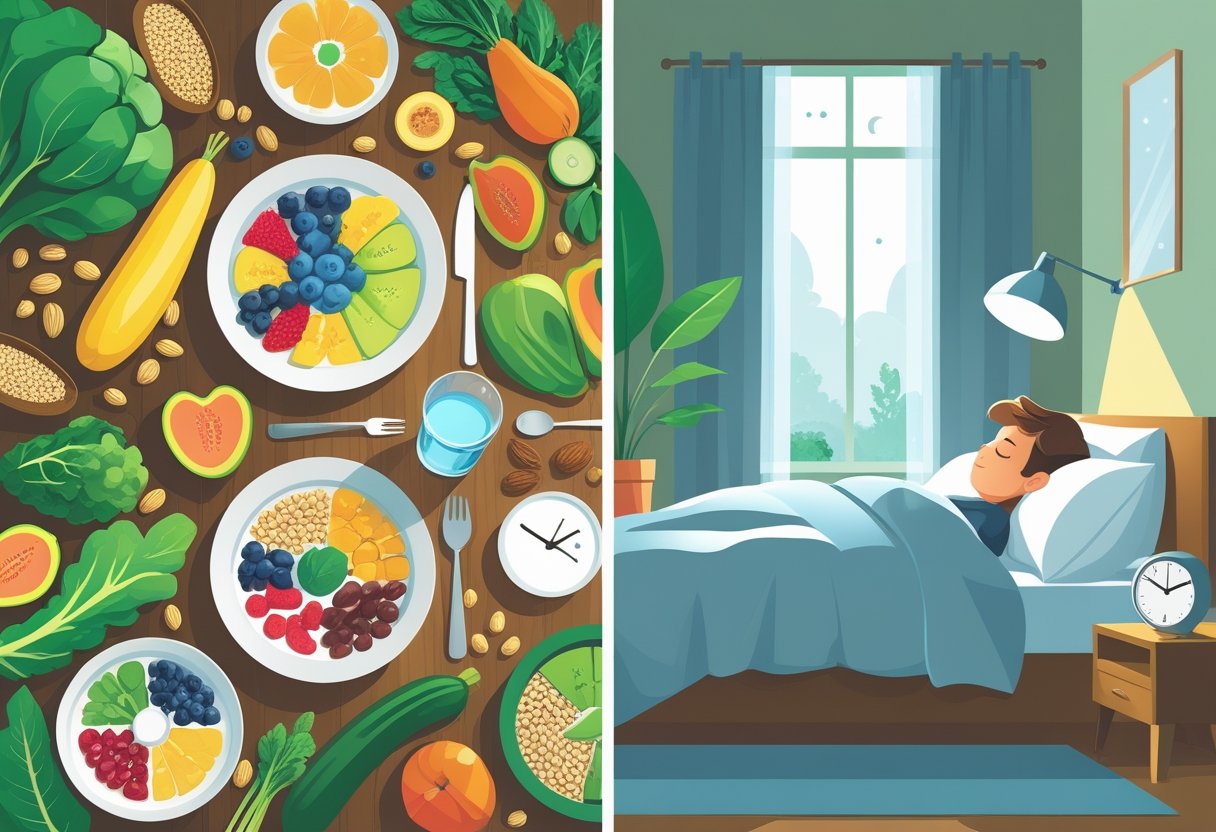
Key Dietary Components That Influence Sleep
Certain nutrients and foods influence a person’s sleep. The balance of macronutrients, vitamins, minerals, and specific sleep-related compounds all affect how long and how well you rest. Knowing what to eat and what to avoid can improve sleep and overall health.
Macronutrients: Carbohydrates, Proteins, and Fats
Carbohydrates increase the availability of tryptophan in the brain. Tryptophan helps the body produce serotonin and melatonin, hormones that regulate sleep. Low-glycemic carbs, like whole grains, keep blood sugar stable and support better sleep.
Proteins provide amino acids such as tryptophan. Foods like lean meat, dairy, and legumes supply these building blocks for serotonin, which can help you fall asleep more easily.
Fats can affect sleep in different ways. Unsaturated fats, especially omega-3s in fatty fish, support rest by reducing inflammation. Saturated and trans fats, found in processed foods, may disturb sleep. Keeping fats balanced helps maintain steady sleep.
Micronutrients Supporting Sleep Health
Some vitamins and minerals are essential for the body’s sleep system. Magnesium regulates neurotransmitters that calm the body. Low magnesium is linked to poor sleep. Vitamin D is connected to sleep health. Foods like fatty fish and fortified dairy can help maintain healthy levels.
B vitamins, especially folate and B6, support neurotransmitter production. Leafy greens and fruits like kiwi provide folate, which can benefit sleep. Zinc also helps regulate sleep and immunity, and seafood like oysters is a good source. A balanced intake of these nutrients supports better rest.
Sleep-Promoting Compounds: Melatonin, Tryptophan, and Magnesium
- Melatonin signals the body to prepare for sleep. It is found in foods such as cherries, grapes, and some other fruits. Eating these foods may help you fall asleep faster.
- Tryptophan is an amino acid that converts to serotonin and melatonin. Dairy, poultry, and cereals contain tryptophan and may help reduce the time it takes to sleep.
- Magnesium calms the nervous system and supports deep sleep. Nuts, seeds, and leafy vegetables are good sources. Together, melatonin, tryptophan, and magnesium help regulate the sleep-wake cycle and improve rest.
Foods to Limit for Better Rest
- Caffeine blocks adenosine, a chemical that makes you sleepy. Avoid it at least six hours before bed to prevent disrupted sleep.
- Alcohol may make you drowsy but fragments sleep and reduces deep sleep. Limiting alcohol near bedtime supports better rest.
- High-sugar and high-fat processed foods can disturb sleep through blood sugar spikes and inflammation. Eating these often leads to more nighttime awakenings.
- Nicotine is another stimulant that disrupts rest. Avoid it in the evening to protect your sleep.
Cutting back on these foods can help maintain natural sleep patterns and improve overall sleep quality.

Dietary Patterns and Sleep Disorders
Food has a direct impact on sleep. Food affects hormones, inflammation, and other body functions that control sleep quality and length. Some diets can make sleep problems worse, while others may help ease them.
Effects of Poor Nutrition on Insomnia
Unhealthy eating habits can throw off hormones tied to sleep, like melatonin and cortisol. Diets loaded with sugar and refined carbs can raise the risk of insomnia by spiking blood sugar and increasing inflammation. People who don’t get enough fiber or nutrients such as vitamins B and D may also struggle with sleep.
Caffeine and foods that raise blood sugar quickly can push back the time it takes to fall asleep. Protein also plays a role because it affects tryptophan, a building block for serotonin, which helps regulate sleep. But even small amounts of protein can sometimes limit tryptophan’s benefits.
A balanced diet that includes vitamins, minerals, and steady blood sugar support can ease insomnia symptoms. Keeping blood sugar stable and lowering inflammation is key for better rest.
Dietary Triggers for Sleep Apnea
Certain eating patterns can worsen obstructive sleep apnea (OSA). Too many calories and high amounts of saturated fat raise the chance of obesity, which is the main risk factor for OSA. Extra weight narrows the airway, making breathing problems during sleep more likely.
Lack of omega-3 fatty acids may also add to the problem by promoting inflammation. On the flip side, meals that include fruits, vegetables, and whole grains can help with weight control and reduce inflammation, which may improve OSA symptoms.
Diet alone won’t cure sleep apnea, but proper nutrition plays an important role in managing it. Avoiding processed foods high in sugar and saturated fats can lower the risk factors that make the condition worse.
Chronic Inflammation, Diet, and Sleep Disruption
Chronic inflammation is closely tied to poor sleep and disorders like insomnia. Food plays a big part in controlling inflammation. Diets high in processed items, added sugar, and saturated fats raise markers such as C-reactive protein (CRP) and interleukin-6, both linked to inflammation. This kind of inflammation can disturb sleep by disrupting hormones and brain activity. In contrast, eating more anti-inflammatory foods, like fish rich in omega-3s, nuts, fruits, and vegetables, can lower inflammation and support healthier sleep.
Changing what you eat to calm inflammation may help those with ongoing sleep struggles. Diets focused on whole foods, fiber, and antioxidants have been connected to better sleep and overall wellness.
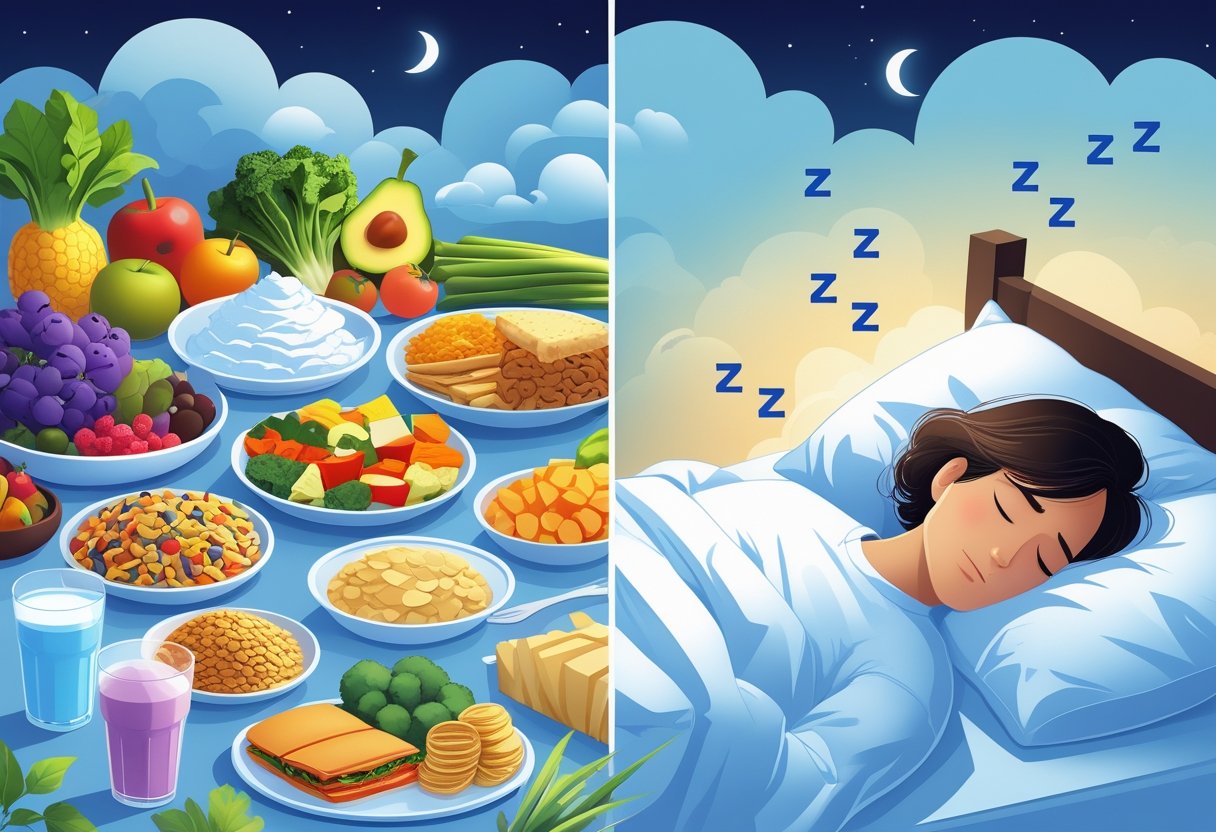
Timing of Meals and Its Effect on Sleep
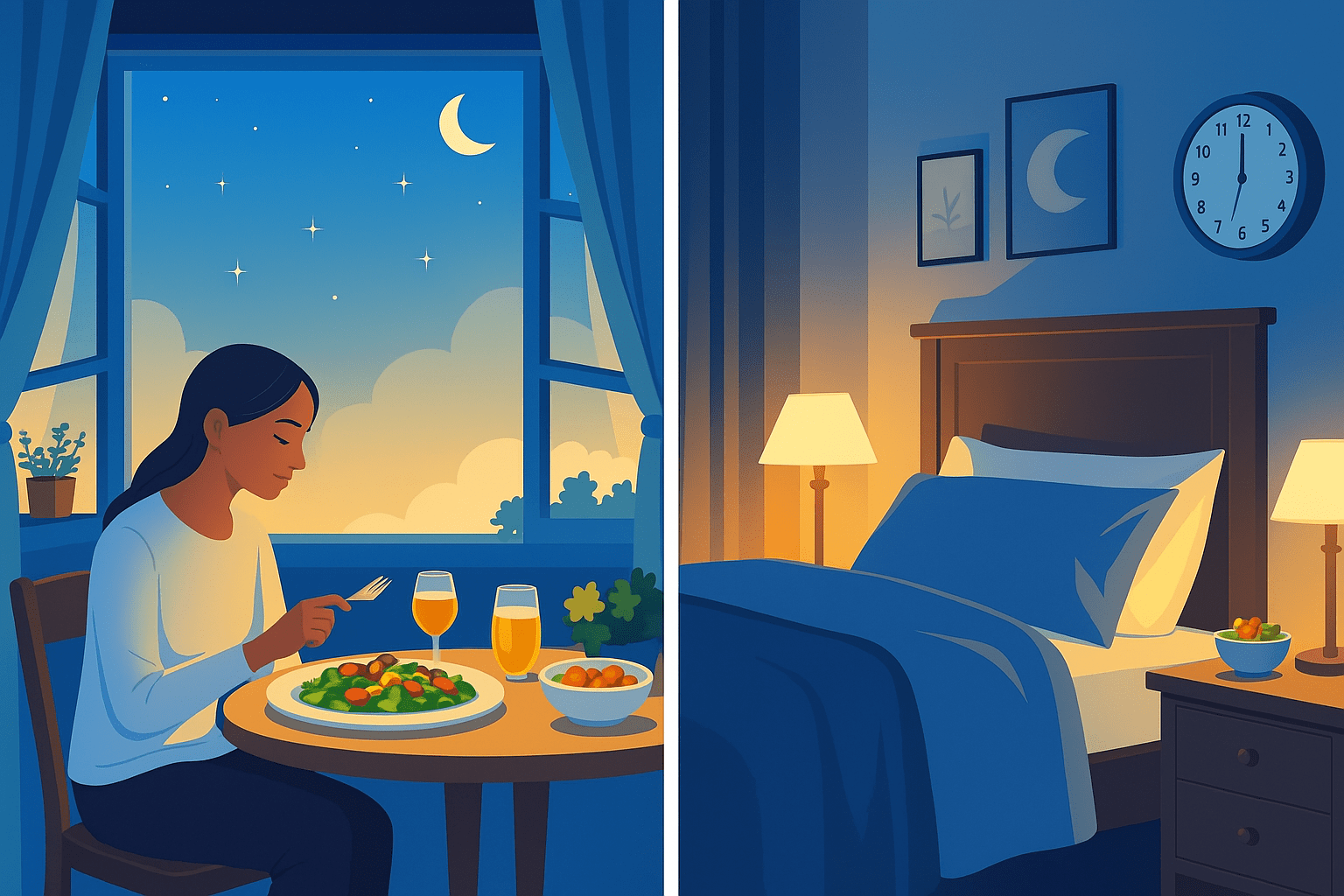
Eating during the day impacts how quickly a person falls asleep and how long they stay asleep. Both the timing and number of meals influence the body’s internal rhythm, which sets the pace for rest.
Best Times to Eat for Healthy Sleep
Meals earlier in the day help the body stay on track. Breakfast around 8:25 a.m. has been linked to stronger sleep quality at night. Dinner works best when eaten two to three hours before bed, giving the body time to digest and prepare for rest. Evening meals between 6 and 7 p.m. are tied to better metabolism during sleep and deeper rest overall.
Keeping meal times steady helps regulate the body’s internal clock and supports longer sleep with fewer wakeups during the night.
Late-Night Eating and Sleep Disturbance
Eating close to bedtime can disrupt rest. Food or snacks within an hour of sleep can delay the process of falling asleep and cause broken sleep cycles.
Late meals may affect hormones such as melatonin and insulin, which are key for quality rest. This disruption can lead to lighter, less restorative sleep. Regular late-night eating increases chances of restlessness and waking up often. Finishing meals earlier and avoiding heavy foods in the evening supports calmer, deeper sleep.
For more detailed findings on meal timing and sleep quality, see the study on meal timing and sleep quality from a chronobiological perspective.
Practical Strategies for Improving Sleep Through Diet

Adjusting eating habits can lead to better sleep quality and duration. Choosing the right foods and eating at the right times helps the body’s sleep-wake rhythm. Even small shifts in diet can affect how quickly someone falls asleep and how deeply they rest.
Daily Meal Planning Tips
Eating meals at consistent times keeps the body’s clock in sync. Big or heavy dinners right before bed can cause discomfort and interrupt sleep, so it’s better to finish eating a couple of hours before lying down.
Cutting back on caffeine after the early afternoon matters because it lingers in the system and delays sleep. Alcohol near bedtime can also affect rest, since it breaks up the sleep cycle and leaves you feeling less restored.
Balanced meals through the day, mixing protein, healthy fats, and complex carbs, help keep blood sugar steady. This balance reduces the chance of waking up in the night from dips in energy. Sticking to a regular meal schedule also supports both nutrition and sleep health.
Foods That Help Promote Sleep
Certain foods contain natural compounds that help the body wind down. Magnesium-rich options like pumpkin seeds, almonds, and spinach support muscle and nerve relaxation. Fish such as salmon and sardines, packed with omega-3s, also helps in supporting deeper sleep. Tart cherries and kiwifruit provide natural melatonin and antioxidants. Eating them about an hour before bed has been linked to longer and better-quality rest.
Other helpful compounds include L-theanine in green tea, glycine in chicken and gelatin, and valerian root as a supplement. These can ease the time it takes to fall asleep and improve sleep without heavy side effects. When adding these foods to your routine, it’s best to consider your own needs and preferences. This way, diet changes support both your overall health and your sleep.
How Your Mattress Supports Sleep and a Healthy Diet
A good mattress does more than just help you sleep comfortably, it can also play a part in managing your diet. When you get solid, uninterrupted rest, your body balances hormones that control hunger and fullness. That makes it a lot easier to avoid those extra cravings.
If your bed feels too stiff or too soft, you probably already know how restless nights feel. Tossing and turning leads to poor sleep, and poor sleep often means grabbing sugary or high-calorie foods the next day. Comfort and support really do make a difference. Temperature is another big factor. A mattress that stays cool helps prevent overheating and late-night wake-ups. When you sleep soundly through the night, your metabolism works the way it should, and you’re less likely to snack out of fatigue.
The right mattress also leaves you waking up with more energy and a better mood. That makes sticking to healthy eating habits much easier. On the flip side, lack of sleep can leave you drained and reaching for quick fixes.
Mattress features that help with sleep and diet:
- Proper spinal alignment
- The right firmness level for your body
- Breathable, cooling materials
- Long-lasting support
That’s why investing in a good mattress is worth it. The DreamCloud Premier Hybrid Mattress is one option to look at since it blends plush comfort with solid support and a cool-to-the-touch cover.
What makes it even better is the quilted Euro top and the mix of memory foam and coils. You get that cozy “sink in” feel without losing the support your body needs. Also, deeper rest means fewer late-night cravings and more energy to actually stick to your diet goals.


